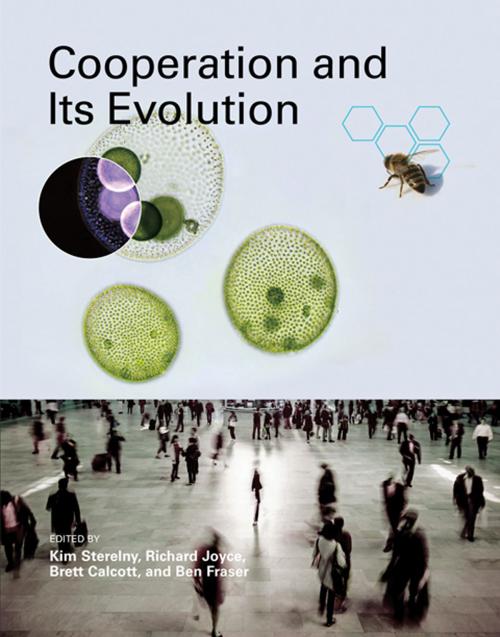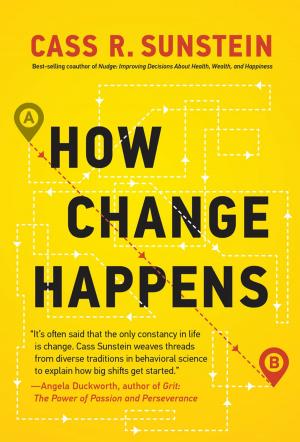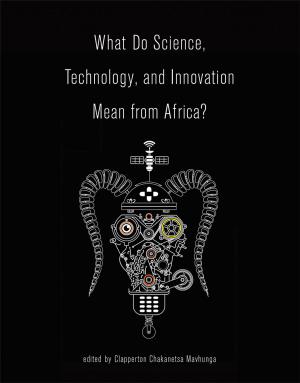Cooperation and Its Evolution
Nonfiction, Science & Nature, Science, Biological Sciences, Evolution, Other Sciences, Philosophy & Social Aspects| Author: | Don Ross, Jessica C Flack, Doug Erwin, Tanya Elliott, David C. Krakauer, Hanna Kokko, Katja Heubel, Paul Seabright, Herbert Gintis, Ronald Noe, Bernhard Voelkl, Haim Ofek, Deborah M Gordon, Adam G Hart, Andrew Cockburn, Brian Skyrms, Simon Huttegger, Livio Riboli-Sasco, Sam P. Brown, Nicholas Shea, Cecilia Heyes, Fiery Cushman, Hugo Mercier, Felix Warneken, Joseph Henrich, Maciek Chudek, Wanying Zhao, Daniel Fessler, Katinka Quintelier, June Tangney, Jeffrey Stuewig, Elizabeth Malouf, Kerstin Youman, Daniel Kelly, Matteo Mameli, Kim Sterelny, Richard Joyce, Brett Calcott, Ben Fraser | ISBN: | 9780262313049 |
| Publisher: | The MIT Press | Publication: | February 22, 2013 |
| Imprint: | A Bradford Book | Language: | English |
| Author: | Don Ross, Jessica C Flack, Doug Erwin, Tanya Elliott, David C. Krakauer, Hanna Kokko, Katja Heubel, Paul Seabright, Herbert Gintis, Ronald Noe, Bernhard Voelkl, Haim Ofek, Deborah M Gordon, Adam G Hart, Andrew Cockburn, Brian Skyrms, Simon Huttegger, Livio Riboli-Sasco, Sam P. Brown, Nicholas Shea, Cecilia Heyes, Fiery Cushman, Hugo Mercier, Felix Warneken, Joseph Henrich, Maciek Chudek, Wanying Zhao, Daniel Fessler, Katinka Quintelier, June Tangney, Jeffrey Stuewig, Elizabeth Malouf, Kerstin Youman, Daniel Kelly, Matteo Mameli, Kim Sterelny, Richard Joyce, Brett Calcott, Ben Fraser |
| ISBN: | 9780262313049 |
| Publisher: | The MIT Press |
| Publication: | February 22, 2013 |
| Imprint: | A Bradford Book |
| Language: | English |
Essays from a range of disciplinary perspectives show the central role that cooperation plays in structuring our world.
This collection reports on the latest research on an increasingly pivotal issue for evolutionary biology: cooperation. The chapters are written from a variety of disciplinary perspectives and utilize research tools that range from empirical survey to conceptual modeling, reflecting the rich diversity of work in the field. They explore a wide taxonomic range, concentrating on bacteria, social insects, and, especially, humans.
Part I ("Agents and Environments") investigates the connections of social cooperation in social organizations to the conditions that make cooperation profitable and stable, focusing on the interactions of agent, population, and environment. Part II ("Agents and Mechanisms") focuses on how proximate mechanisms emerge and operate in the evolutionary process and how they shape evolutionary trajectories. Throughout the book, certain themes emerge that demonstrate the ubiquity of questions regarding cooperation in evolutionary biology: the generation and division of the profits of cooperation; transitions in individuality; levels of selection, from gene to organism; and the "human cooperation explosion" that makes our own social behavior particularly puzzling from an evolutionary perspective.
Essays from a range of disciplinary perspectives show the central role that cooperation plays in structuring our world.
This collection reports on the latest research on an increasingly pivotal issue for evolutionary biology: cooperation. The chapters are written from a variety of disciplinary perspectives and utilize research tools that range from empirical survey to conceptual modeling, reflecting the rich diversity of work in the field. They explore a wide taxonomic range, concentrating on bacteria, social insects, and, especially, humans.
Part I ("Agents and Environments") investigates the connections of social cooperation in social organizations to the conditions that make cooperation profitable and stable, focusing on the interactions of agent, population, and environment. Part II ("Agents and Mechanisms") focuses on how proximate mechanisms emerge and operate in the evolutionary process and how they shape evolutionary trajectories. Throughout the book, certain themes emerge that demonstrate the ubiquity of questions regarding cooperation in evolutionary biology: the generation and division of the profits of cooperation; transitions in individuality; levels of selection, from gene to organism; and the "human cooperation explosion" that makes our own social behavior particularly puzzling from an evolutionary perspective.















